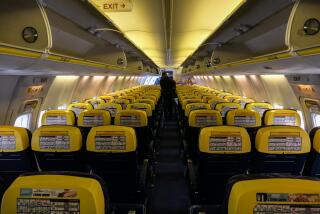As a flight attendant, he helped many sick passengers. Suddenly, he was one of them

- Share via
Like many flight attendants who have worked the friendly skies, I’ve administered in-flight medical assistance to numerous ailing passengers.
I’ve bandaged the wounds of accident victims and administered oxygen to those who have collapsed from exhaustion (and worse). I even helped administer an intravenous saline solution to a woman whose blood pressure had dropped to such a precarious level that paramedics had to wheel her away when we reached our destination.
Throughout 33 years of passenger service, I never imagined I would ever be the ailing passenger.
On Oct. 5, after a month-long vacation in Southeast Asia, I prepared for the long trip home — a 15-hour trek from Hong Kong to Dallas, to be followed by a two-hour wait for a three-hour flight to Miami.
Before boarding any epic flight, I like to load up on sustenance. At Hong Kong International Airport, the restaurant choices seemed endless. Such lofty names as Caviar House & Prunier Seafood Bar were a bit out of my price range, so I settled on a Chinese fast-food eatery.
I ordered the sweet and sour chicken. In retrospect, I wish I had not. The restaurant was packed with travelers hunched over bowls of rice and noodles. Piles of luggage occupied every imaginable space.
The only available seat was adjacent to a young Chinese woman who motioned for me to sit. Turns out she was a 22-year-old from Beijing who had been traveling on her own in Australia.
I dived into food and conversation, vaguely realizing that the sweet and sour chicken seemed crunchier than usual. If I had been traveling alone, I might have pushed the food away and tried another restaurant.
But because I was talking with a woman who had grown up on the opposite side of the world, because she shared my passion for solo travel and had been kind enough to invite me to her table, I continued to gobble up the conversation and the unusually crunchy sweet and sour chicken.
After the meal, we wished each other a pleasant flight and walked to our respective departure gates. That’s when the first stomach rumblings began.
As I walked down the jet bridge, I felt as though compressed air were being pumped into my insides. My belly tightened. I wanted to belch, but no air would come forth. Lucky for me, I was traveling on an employee pass and had been issued the last available seat, adjacent to the lavatory.
The way my stomach was acting, proximity to the lavatory might prove important.
The airplane roared down the runway. My stomach roared in response. We leaped into a clear blue sky, but as I stared out the window, it seemed as though we were plunging toward the crimson gates of hell.
Never had I endured such agony. My stomach churned, knotted, somersaulted and threatened to betray me.
The plane climbed in a steep ascent, the seat belt sign continued to illuminate and yet I unfastened my seat belt and lunged into the lavatory.
Nothing happened.
I returned to my seat. Beads of sweat formed on my forehead. At one point, the pain became so severe I leveled the sleeper seat and crouched there on my hands and knees.
When a concerned flight attendant approached, all I could mutter was, “Food poisoning.” There was nothing anyone could do.
During the lengthy meal service, I remained on all fours, shivering like a dog in the rain.
At some point, the crew notified the captain. Depending on the severity of a passenger’s illness, the captain must decide whether to divert the plane and land at a nearby airport, or continue to the original destination.
“How bad is it?” one of the flight attendants asked.
“I’ll make it,” I replied.
And I did, although it was the longest and most painful 15-hour flight of my life.
When I finally reached my apartment near Miami, about 24 hours after leaving Hong Kong, I curled up on my bathroom floor. Nature finally ran its course. I felt significantly better and suffered minimal aftereffects.
I’ll never know for sure whether this was food poisoning or that other common gastro demon, norovirus, commonly referred to as “stomach flu.”
Norovirus is highly contagious and is spread by consuming contaminated food or water, contact with an infected person or by touching contaminated surfaces. Food poisoning, a food-borne illness, is caused by eating food contaminated by bacteria, viruses or parasites.
The two illnesses are often confused because they share similar symptoms.
But this is what leads me to think mine wasn’t norovirus. With that, symptoms appear within 12 to 48 hours after exposure. With food poisoning, symptoms can occur in about an hour, which is the time took for me to board my flight after eating the bad sweet and sour chicken.
Whatever it was, I took away some important lessons.
My illness was difficult, but not bad enough for me to ask the captain to return to Hong Kong or land at a nearby airport. I’ve worked many flights that diverted for one reason or another, so I understand the consequences.
Some passengers will miss connections and become angry. Others stress out at the thought of spending several hours at an unplanned stop. If the plane is forced to land in a foreign country, local officials may decide to quarantine the flight if they suspect the sick passenger is suffering from a communicable disease.
Also, when a plane is forced to land soon after takeoff, the captain will need to dump hundreds of gallons of jet fuel so the aircraft will be light enough to land. Because I was aware of these issues, I wouldn’t ask the pilots to divert unless I felt close to death.
Besides, I was embarrassed.
But if you’re sick, you should always flag down a flight attendant.
If we can’t treat the symptoms, we will ask for a physician, paramedic or nurse who may be onboard.
If no qualified passenger responds, we’ll notify the captain. He or she can radio the airline’s doctor on call, a 24-hour physician on the ground who interprets symptoms, recommends treatment and helps decide whether the passenger requires immediate medical attention on the ground.
For food poisoning, there’s not much anyone can do, save spending time in the lavatory. There you may, as I did, ponder whether this was life’s way of reminding me that I had just had a glorious vacation in Southeast Asia and that sometimes you have to pay to play.
More to Read
Sign up for The Wild
We’ll help you find the best places to hike, bike and run, as well as the perfect silent spots for meditation and yoga.
You may occasionally receive promotional content from the Los Angeles Times.






